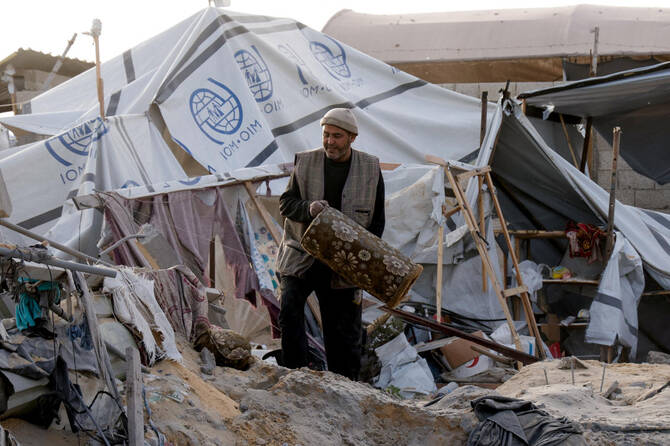JERUSALEM, NEW YORK: At least 12 people including children were killed overnight in Gaza by Israeli strikes, hospital workers said Wednesday.
The pre-dawn strikes hit three houses in the urban Nuseirat refugee camp, according to staff at the Al-Aqsa Hospital, which received the bodies.
Among the dead were three children, including two brothers whose bodies arrived in pieces, according to the hospital’s morgue.
Israel has carried out daily strikes on Gaza since ending its ceasefire with Hamas last month.
It has cut off the territory’s 2 million Palestinians from all imports, including food and medicine, since the beginning of March in what it says is an attempt to pressure the militant group to release hostages.
The strikes come after more than two dozen people were killed earlier this week in Gaza City and Beit Lahiya.
Israel’s war against Hamas in Gaza has killed more than 52,000 Palestinians, according to the territory’s Health Ministry.
Meanwhile, Israel’s military said it arrested Ali Samoudi, a well-known journalist, in a raid in Jenin, a Palestinian city in the north of the territory.
Samoudi previously worked for international outlets including CNN and Al Jazeera. In 2022, he was injured in the same spray of gunfire that killed prominent Palestinian journalist Shireen Abu Akleh.
US officials say Akleh was shot dead by an Israeli sniper.
Israel’s military said Samoudi was affiliated with and transfered funds for the Islamic Jihad militant group, without providing evidence.
They said Samoudi had been transferred to Israel’s security forces.
Samoudi’s arrest is the latest of dozens of Palestinian journalists detained by Israel since the start Israel’s war with Hamas, which began on Oct. 7, 2023.
In a related development, Lebanon’s President Joseph Aoun, who met a US military delegation on Wednesday, urged it to pressure Israel to withdraw from areas it still controls in the country and to release Lebanese prisoners. The delegation was headed by US Maj. Gen. Jasper Jeffers, the co-chairman of the Cessation of Hostilities Implementation Mechanism.
Aoun told the American delegation that the Lebanese army was carrying out its work along the border with Israel, where troops had been confiscating weapons and preventing armed presence.
A statement released by Aoun’s office said that Jeffers, who had held the post since before the Israel-Hezbollah war ended in late November, will be replaced by Maj. Gen. Michael J. Leeney. It added that Leeney also attended Wednesday’s meeting.
Separately, Iran’s official IRNA news agency reported on Wednesday that a man, identified as Mohsen Langarneshin, was hanged. It said he had played role in the 2022 killing of a Revolutionary Guard colonel in Tehran, and called him a “senior spy” for the Mossad.
The report said he had provided “technical support” in the assassination of Col. Hassan Sayyad Khodaei, shot five times by gunmen on a motorbike outside his home in Tehran.
The report said Langerneshin confessed in Iran’s Revolutionary Court. It said the Mossad recruited Langarneshin in 2020 and that he met Israeli intelligence officers in Georgia and Nepal.
Langarneshin reportedly rented safe houses for operatives in several Iranian cities, including Isfahan, when, in January 2023, bomb-carrying drones targeted what Iran described as a military workshop. Iran has accused Israel of being behind the attack.
Meanwhile, a federal judge ordered US immigration authorities to release a Palestinian student detained at a citizenship interview earlier this month over his role in Columbia University’s Gaza war protests.
Mohsen Mahdawi, who was slated for deportation, struck a defiant tone outside a courthouse in the northeastern state of Vermont.
“I am not afraid of you,” he said, “If there is no fear. What is it replaced with? Love, love is our way.”




























